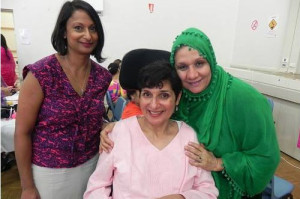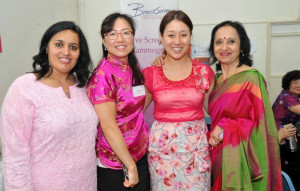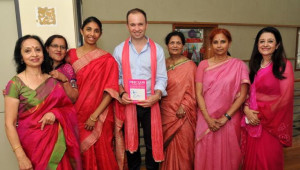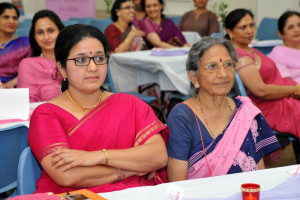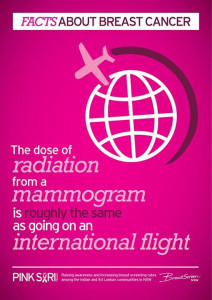”˜Low level of mammogram radiation is safe’ : Chief Cancer Officer
Professor Nirmala Pathmanathan with breast cancer survivor Maina Gordon at the Pink Sari event held in Pennant Hills community Centre
New research has shown that a misunderstanding about the safety of breast screening mammograms is making women from Indian and Sri Lankan communities afraid of having lifesaving breast screens. Chief Cancer Officer and CEO of the Cancer Institute NSW, Professor David Currow explained that the small amount of radiation from screening mammograms is harmless and is far outweighed by the risk of cancer that results from not screening.
Tammy Yam (2nd from left) from BreastScreen NSW who worked with Shantha Viswanathan (rhs) and her group of friends at the International Women’s Day event. They managed to secure 15 new mammogram appointments!
“A breast screening mammogram is completely safe. It causes about the same amount of radiation that a person would receive from flying from Australia to London and back,” Professor Currow said.
“One of the most important things that women aged 50-74 can do for their health is to participate in breast screening. Early detection of breast cancers means women have less invasive treatment options and better survival outcomes.
“In Australia, 1 in 8 women with be diagnosed with breast cancer in their lifetime and 1 in 3 women will develop some form of cancer.”
Matt Keane, MP, Member for Hornsby was at the event with ladies dressed in pink as he was handed pink dupatta to be part of the breast screen awareness campaign
To encourage more women from Indian and Sri Lankan communities to understand the importance of breast screening, the Pink Sari Project was initiated last September by the NSW Multicultural Health Communication Service in partnership with the NSW Refugee Health Service with funding from the Cancer Institute NSW.
Service Director at Westmead Breast Cancer Institute, Associate Professor Nirmala Pathmanathan, said that it was during Pink Sari activities that women explained they were not booking their breast screens because of fear that the radiation could cause serious health problems, including cancer.
“Uncovering this misunderstanding has helped us provide relevant information to allay the women’s fears and create a groundswell of Pink Sari supporters who can educate and encourage other women to screen,” Associate Professor Pathmanathan said. “Through Pink Sari Project sessions, there is now better understanding of breast cancer and the role of breast screening in early detection and better treatment outcomes.
“We have received tremendous support from the Indian and Sri Lankan community leaders, health workers, medical practitioners and members who have been spreading the important message of regular breast screening for women aged 50-74.
“Pink Sari has been a real community effort and everyone involved should be proud of the impact they are making on the lives of women from Indian and Sri Lankan communities.”
All women aged between 50 and 74 should book 13 20 50 to book your free mammogram. For more information, visit the Pink Sari Project website www.pinksariproject.org Join the conversation on www.facebook.com/thepinksariproject
Short URL: https://indiandownunder.com.au/?p=4889

